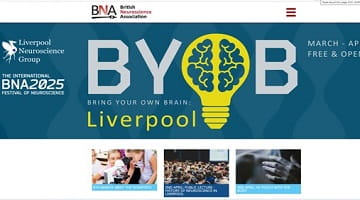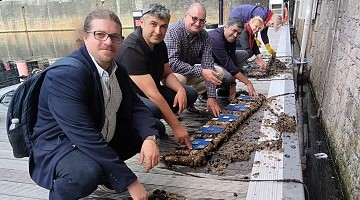Why study this course with LJMU?
- A practical, hands-on course, taught using state-of-the-art teaching laboratories
- Gain an understanding of the principles and applications of biotechnology and practise the latest molecular, bioprocessing and analytical techniques
- Offers fascinating research projects in areas such as synthetic biology, genetic engineering of crop plants, fermentation technology, bioremediation and antimicrobial resistance
- Benefit from strong links with industry for industrial placements
- Excellent spring board into careers as diverse as biopharmaceutical manufacturing, drug discovery and development, food technology and biofuel production
- Opportunities to undertake a year's industrial placement or work abroad
- International Foundation Year course available offering direct progression onto this degree programme - visit LJMU's International Study Centre to find out more
- Stepping stone to postgraduate study in MSc Industrial Biotechnology
About your course
BSc (Hons) Biotechnology explores the manipulation of biomolecular processes to develop technologies and products that address global challenges in health, food and the environment. The course provides excellent facilities to develop practical skills and exciting opportunities to engage with industry.
Biotechnology is a fascinating field of study, which has had a positive impact on many aspects of our lives, with applications across medicine, food and the environment.
This multidisciplinary science builds on a foundational knowledge of molecular and cell biology, microbiology and biochemistry, using transgenic plants, animals and microbes to develop valuable technologies and products. Early known examples of biotechnology include the use of microorganisms to make cheese, bread and wine, but advances in genetic engineering and recombinant DNA technology have revolutionised the biotechnology industry. Modern biotechnology has enabled production of drugs, vaccines, energy, industrial chemicals and progressed developments in gene therapy, cancer therapy and sustainable agriculture.
This is a practical, hands-on course in which you will spend a large proportion of your time in our excellent teaching labs for cell culture, molecular biology and imaging studies, practising the latest molecular, bioprocessing and analytical techniques. You will gain an understanding of the principles and applications of biotechnology across this broad-based sector. Optional modules and a research project in the final year provide opportunities to specialise in your own particular area of interest. You will have plenty of opportunities to put your skills and knowledge into practice and explore your own interests by completing a research project. The option to do a years industrial placement between the second and third year will also help develop transferable skills, valued by employers.
The programme enables you to develop intellectual independence, critical awareness and transferable skills — attributes that are vital for employment. There is an emphasis on career development, with additional input from external speakers from industry, increasing your understanding of the business of biotechnology. As well as exploring a wide range of career options, you will develop commercial awareness and learn how new start-up biotechnology companies are created.
Opportunities for study abroad and placements
The School of Pharmacy and Biomolecular Sciences has an excellent track record of providing relevant vocational training for students. Students are supported by Erasmus and Professional Training Tutors who are responsible for advertising placements and promoting vocational training to students.
Course modules
What you will study on this degree
This course is currently undergoing its scheduled programme review, which may impact the advertised modules. Programme review is a standard part of the University’s approach to quality assurance and enhancement, enabling us to ensure that our courses remain up to date and maintain their high standard and relevancy.
Once the review is completed, this course website page will be updated to reflect any approved changes to the advertised course. These approved changes will also be communicated to those who apply for the course to ensure they wish to proceed with their application.
Further guidance on modules
Modules are designated core or optional in accordance with professional body requirements, as applicable, and LJMU’s Academic Framework Regulations. Whilst you are required to study core modules, optional modules provide you with an element of choice. Their availability may vary and will be subject to meeting minimum student numbers.
Where changes to modules are necessary these will be communicated as appropriate.
Core modules
Introduction to Structural and Functional Biochemistry
20 credits
20 credits
This module enables you to develop a basic fundamental understanding of structural and functional aspects of macromolecules, particularly proteins, in biology. This module will also enable you to demonstrate understanding of how protein structure impacts on protein function.
Physiological Biochemistry
20 credits
20 credits
This module enables you to explore the link between, nutrition, physiology and cellular metabolism in prokaryote and eukaryote cells. In addition, the chemistry which underpins each biochemical process is made clear by making use of worked examples and through practical experiments. This module will also introduce you to the concept of cellular metabolism and how nutrition and physiology impact on both eukaryotic and prokaryotic cells.
Introduction to Biotechnology
20 credits
20 credits
This module provides an overview in biotechnology and the main applications including bioprocessing. You will explore how the biotechnology industry has developed in different fields.
Practical Skills in Biotechnology
20 credits
20 credits
This module facilitates your effective study of Biotechnology by providing a foundation in basic methodology, data handling, IT, laboratory techniques and skills and study skills via lectures, practicals, workshops (including IT) and tutorials which are a mixture of academic material and transferable skills. This module will also provide you with an opportunity for personal development planning.
Microbial Biotechnology 1
20 credits
20 credits
This module provides you with a broad spectrum of knowledge about microorganisms and their activities which will provide a foundation for microbiology modules at Levels 5 and 6. The module will be delivered through a series of lectures, practicals and workshops.
Introduction to Molecular Biology
20 credits
20 credits
This module enables you to understand the importance of the molecular mechanisms underpinning molecular biology. This will then introduce you to omics and model organisms which will be further developed at Level 5. Tutorials linked to subject material as well as personal development planning are embedded in this module.
Core modules
Molecular Biology and Functional Genomics
20 credits
20 credits
This module provides you with a detailed understanding of the molecular mechanisms that are applicable to human disease states, development and genetic engineering. The module will empower you to demonstrate a critical understanding of genomic integrity and human disease. Transcriptional control, developmental biology, genetic engineering and bioinformatics will be introduced. You will encounter experimental methods for the investigation of the relevant areas of biochemistry and molecular biology using data from high-throughput techniques.
Sterile Pharmaceutical Products
20 credits
20 credits
This module enables you to learn about the formulation, preparation, manufacture and quality control of sterile products. You will be able to describe and discuss the principles and practice of sterilisation and the concepts of quality assurance of sterile products.
Structural and Functional Biochemistry
20 credits
20 credits
This module enables you to develop a deeper understanding of structural and functional aspects of macromolecules, particularly proteins, in biology. The module provides you with a detailed view of aspects of the structure and function of macromolecules and relationships between the two.
Research Methods in Biotechnology
20 credits
20 credits
This module equips you with essential research skills, knowledge of methods and techniques that are routinely applied in biotechnology research. Through a range of teaching and learning activities this module will provide you with opportunities to learn, develop and demonstrate a range of key biotechnology research skills and knowledge.
Synthetic Biology and Bioengineering 1
20 credits
20 credits
This module provides you with the basic concepts of synthetic biology and a good understanding of the foundational science that underpins synthetic biology. It enables you to develop appreciation for the importance of social responsibility in bioengineering. This module will also provide personal development planning support for level 5 students on the Biotechnology programme.
Microbial Biotechnology 2
20 credits
20 credits
This module is designed to develop your understanding of the physiology and behaviour of microorganisms populating various habitats with emphasis on their responses to particular physical and chemical conditions. It will also develop a broad understanding of the biotechnological importance of microorganisms.
Optional modules
Sandwich Year - Biotechnology
120 credits
120 credits
The aim is to provide students with an extended period of work experience at an approved partner that will complement their programme of study at LJMU. This will give students the opportunity to develop professional skills relevant to their programme of study as well as the attitude and behaviours necessary for employment in a diverse and changing environment. This extended placement forms a key part of a sandwich degree. All placements need to be assessed and approved prior to commencement in line with the LJMU Placement Learning Code of Practice. The Code of Practice requires students to conduct themselves in a professional and responsible manner during the placement - failure to do so may lead to the placement being terminated prematurely. Placements are normally for one calendar year on a full-time basis. Split placements of a shorter duration may be permissible. There is an expectation that a minimum of 1200 hours will be spent in the workplace.
Study Year Abroad - Biotechnology
120 credits
120 credits
The aim is to provide students with an additional year of study at an approved overseas partner that will complement their programme at LJMU. This is an additional year of full-time study at an approved higher education institution. The modules to be studied must be agreed in advance, and must be appropriate for the student's programme of study. Assuming successful completion of this year, mark-bearing credit will be awarded by the Faculty Recognition Group. The grade conversion scale to be used will be made available in advance of the year abroad.
Study Semester Abroad - Biotechnology
60 credits
60 credits
The aim is to provide students with a semester of study at an approved overseas partner that will replace one semester of their LJMU programme at level 5.This is a semester of full-time study at an approved higher education institution which will replace one semester of level 5 study at LJMU. The modules to be studied must be agreed in advance, and must be an appropriate substitute for the modules being replaced. Assuming successful completion of this semester, mark-bearing credit will be awarded by the Faculty Recognition Group. The grade conversion scale to be used will be made available in advance of the semester abroad.
Core modules
Current Topics in Biotechnology
20 credits
20 credits
This module will enable you to develop an in depth understanding of the principles and applications of the white, red and blue biotechnology and their impact in our society through an integrated knowledge of concepts. The focus is on the delivery of core knowledge through a series of lectures and workshops.
Biotechnology Entrepreneurship
20 credits
20 credits
The aim of this module is to introduce you to the concept of entrepreneurship and commercialisation of biotechnology. The module will explore a range of activities, processes and concepts that are needed for new venture creation. It will equip you with the knowledge and skills vital for communicating ideas and generating value in a knowledge based economy.
Synthetic Biology and Bioengineering 2
20 credits
20 credits
This module provides in-depth knowledge of current concepts and applications of synthetic biology and bioengineering with emphasis on tackling specific industrial, biomedical and environmental challenges.
Biochemistry/Biotechnology Research Project
40 credits
40 credits
You will have the opportunity to undertake some NHS and Pharmaceutical industry-related laboratory research projects or traditional research projects.
Optional modules
Industrial Product Development
20 credits
20 credits
Within this module, you will gain information relating to pharmaceutical manufacturing processes and the associated regulatory controls to ensure consistency of patient safety.
Microbial Technology
20 credits
20 credits
This module will build upon core knowledge in microbiology covered in levels 4 and 5. It will provide you with training and assessment in areas including bioinformatics, new generation sequencing and its applications, antibiotic production, imaging technology, antibiotic resistance, phage therapy and will include the application of microbial processes to bioremediation and also product formation.
Work-Based Learning
20 credits
20 credits
The aim of this module is to provide an opportunity to spend time in a workplace environment relevant to your subject discipline, that you have acquired personally. You will build links between theory and practice through practical experience of work - reinforcing and complementing formal study.
Recombinant Proteins
20 credits
20 credits
This module aims to provide in-depth knowledge of current approaches used in recombinant protein production and their applications in different biotechnology sectors.
Your Learning Experience
Excellent facilities and learning resources
We adopt an active blended learning approach, meaning you will experience a combination of face-to-face and online learning during your time at LJMU. This enables you to experience a rich and diverse learning experience and engage fully with your studies. Our approach ensures that you can easily access support from your personal tutor, either by meeting them on-campus or via a video call to suit your needs.
The amount of time you spend in each varies according to the module and the level of study. Laboratory sessions give you a chance to develop your practical skills, while workshops and tutorials provide opportunities to discuss course material more informally. All lecture material will be available on our virtual learning environment, Canvas.
You will also be expected to do additional research around lecture subjects in your own time using the University Libraries. As the course progresses, the amount of practical and independent work increases, allowing you to develop research techniques and complete a research project.
Work-related learning
As part of your work-related learning, we highly recommend that you opt to undertake a years work placement after your second year. This will not only give you a chance to put into practice what you have learnt in the first two years, but it will also help you develop your personal skills, earn a salary while taking a years break from formal study and give you a competitive edge when you enter the graduate job market.
If you opt to take a year out on work placement, our Placement Learning and Support Unit will guide you in finding, applying for and securing a placement. During the year, you will have ongoing support from a member of staff, which will include visits to your workplace.
Dedicated personal tutor, plus study skills support
Throughout your course you will have the support of a personal tutor who will be available to discuss course-related matters in both tutorial sessions and on a one-to-one basis. In your final year, you will also have a dedicated supervisor who will provide support during your research project.
The school is fully committed to promoting a learning environment that supports a culture of equality, diversity and inclusivity (EDI) and has a Disability Support Coordinator, an EDI Coordinator and a School EDI Working Group. Personal Tutors also play a vital role in promoting awareness of support services for students.
Assessment varies depending on the modules you choose, but will usually include a combination of exams and coursework.
Most modules are assessed through a combination of exam and coursework and some via coursework only. Exams are normally held at the end of each semester.
- Exams may include a range of question types e.g. multiple choice, short answer, interpretative, problem-based learning and essay questions
- Coursework assessment could be in the form of phase tests, practical reports, data handling, oral presentations, poster presentations, group discussions, essays or demonstrating competence in core practical skills. Most coursework assessments are based on individual assignments but some require group work
Feedback on coursework assessments is normally provided within three weeks of submission and may be via Canvas (our virtual learning environment), face-to-face or in writing. We believe that constructive feedback is vital in helping you identify your strengths as well as the areas where you can improve your work.
Where you will study
What you can expect from your School
You will study at the Byrom Street site in the university's City Campus in the heart of Liverpool. Our state-of-the-art laboratories and teaching spaces will ensure you enjoy a first-class study environment. The Avril Robarts library is within easy walking distance and here you'll find all the information you need to support your studies.
Course tutors

Dr Ismini Nakouti
- Programme Leader
It is a privilege to be able to support students' academic journey, and helping them to achieve their goals is the best part of my job. It is particularly rewarding to see students develop their confidence and skills when working in the laboratory, practicing the latest biotechnology techniques
It is a privilege to be able to support students' academic journey, and helping them to achieve their goals is the best part of my job. It is particularly rewarding to see students develop their confidence and skills when working in the laboratory, practicing the latest biotechnology techniques
Dr Nakouti is a Senior Lecturer in Clinical Microbiology and teaches over the Biotechnology, Pharmacy and Biomedical Sciences subject areas. Her teaching is underpinned by her active research in the areas of diagnostic microbiology, natural products discovery and process development. Dr Nakouti has a PhD in Medical Microbiology and has previously worked for Unilever Research, BEST Research Institute and the National Biomanufacturing Centre. She disseminates her research at both national and international scientific meetings and regularly engages with LJMU outreach activities, giving talks and delivering workshops to schools and the local community.


The BSc Biotechnology course provides a great springboard for a career within the fast-growing Life Sciences sector. The industry-relevant course content, coupled with hands-on lab experience, are great enablers for those wishing to explore industry opportunities. This is a high-quality programme supporting industry, which I would strongly recommend!
Career paths
Graduates will be equipped with the knowledge and skills to pursue employment opportunities world-wide.
Biotechnology graduates are employable in a wide range of industries and organisations, such as pharmaceutical, healthcare, environmental, food industries or regulatory authorities. Some graduates may prefer to continue their studies with postgraduate study (PGCE/PGDE, MSc, MPhil, MRes or PhD) in topics as wide ranging as industrial biotechnology, biomedical sciences, drug discovery and design, cosmetic science, and medical microbiology. The programme is the ideal stepping stone to the MSc Industrial Biotechnology offered by LJMU.
Student Futures - Careers, Employability and Enterprise Service
A wide range of opportunities and support is available to you, within and beyond your course, to ensure our students experience a transformation in their career trajectory. Every undergraduate curriculum includes Future Focus during Level 4, an e-learning resource and workshop designed to help you to develop your talents, passion and purpose.
Every student has access to Careers Zone 24/7, LJMU's suite of online Apps, resources and jobs board via the LJMU Student Futures website.
Tuition fees and funding
- Home full-time per year:
- £9,535
- Placement year:
- £1,905
Fees
The fees quoted above cover registration, tuition, supervision, assessment and examinations as well as library membership and student IT support with access to printed, multimedia and digital resources including programme-appropriate software and on campus Wi-Fi.
Financial Support
The University offers a range of scholarships to support students through their studies. You'll find all the information you need on our specialist funding pages, including details of the Student Support Fund and other activities to support with the cost of living.
Additional Costs
In addition to fees, students should also keep in mind the cost of:
- Accommodation
- Travel costs including those for placements, visas and travel for studying abroad and field trips unless paid for by LJMU
- Stationery, IT equipment, professional body membership and graduation gown hire
The University reserves the right to increase tuition fees in accordance with any changes to the maximum allowable fees set by the UK Parliament. In the event of such a change, any fee increase will be subject to a maximum cap of 10% of the total course cost as originally stated at the time of your offer.
- International full-time per year:
- £18,250
- Placement year international:
- £3,830
International Scholarships and payment plans
Liverpool John Moores University is committed to supporting international students by providing a range of scholarships and flexible payment plans to help students manage their tuition fees.
Scholarships
LJMU provides a variety of undergraduate scholarships to support international students. Scholarships are available to self-funded students who have accepted their offer and met all the conditions outlined in their offer letter. Students must also demonstrate that they can cover living costs, travel, and other expenses associated to studying at the university.
All self-funded international students are eligible for an automatic scholarship worth up to £4,000. For more details and to view our full list of scholarships, visit the international scholarship webpages.
Deposit
All students must pay a £5,000 deposit before they can receive their CAS letter.
For more information view our deposit page.
Tuition Fee Payment Plan
After paying their £5,000 deposit, students have the option to pay their fees in full or in three equal instalments minus any internal scholarships and discounts. There are two payment options available for international students. You can either pay your tuition fees in full before enrolment or opt for a payment plan. With the payment plan, you can pay your fees in three instalments after making your £5,000 deposit. The first instalment is due before enrolment.
All payments should be made through Flywire. Full details can be found in the How to Pay Guide.
Early Bird Tuition Fee discount
We are excited to introduce a £500 Early Payment Discount to all self-funded international students. Eligible self-funded students who pay their fees by the required deadlines will get a discount which will be automatically deducted from the 1st year of tuition fees.
To see the required deadlines please visit the webpage
A DBS check is not required for your application, however a DBS may be required for modules where there is a work based learning placement option. Work based learning placements that do not require a DBS check are available.
Entry requirements
Please choose your qualifications below to view requirements
Grades/points required from qualifications: BCC-BBB (104-120)
Work out how many UCAS points your qualifications are worth by visiting the UCAS Tariff Calculator.
Qualification requirements
GCSEs and equivalents
Grade 4 or grade C or above in English Language and Mathematics/ Numeracy.
GCSE Equivalences accepted:
• Key Skills Level 2 in English/Maths
• NVQ Level 2 Functional skills in Maths and English Writing and or Reading
• Skills for Life Level 2 in Numeracy/English
• Higher Diploma in Maths/English
• Northern Ireland Essential Skills Level 2 in Communication or Application of Number
• Wales Essential Skills Level 2 in Communication or Application of Number
A levels
BCC-BBB
Minimum Number of A Levels: 2
General Studies: Not accepted
Subject requirements: Level 3 qualification in Chemistry and/or Biology or relevant science
BTECs
Extended Diploma: DMM
Access awards
Acceptable on its own and combined with other qualifications
Pass overall with a minimum of 104 points, including relevant subjects.
International Baccalaureate
Acceptable on its own and combined with other qualifications From a relevant subject
OCR Cambridge Technical
Extended Diploma: DMM
Irish awards
Acceptable on its own and combined with other qualifications From a relevant subject
T levels
Acceptable on its own and combined with other qualifications.
You need to obtain the required UCAS points from a related subject area.
International requirements
IELTS
6.0 overall with no component below 5.5, taken within two years of the course start date.
https://www.ljmu.ac.uk/study/courses/international-entry-requirements
Please Note: All international qualifications are subject to a qualification equivalency check.
How to apply
Securing your place at LJMU
UCAS is the official application route for our full-time undergraduate courses. Further information on the UCAS application process can be found here https://www.ljmu.ac.uk/study/undergraduate-students/how-to-apply.
Your university life
From accommodation and academic support to clubs and societies. Find out what LJMU has to offer.
Related Links
Talk to our students
Connect with a current LJMU student for advice and guidance on university life, courses and more.
See what our students are saying
At LJMU we want you to know you're making the right choice by studying with us. You can see what our students are saying about their experience with us via the following websites:
Related Links
News and views
Browse through the latest news and stories from the university










The university reserves the right to withdraw or make alterations to a course and facilities if necessary; this may be because such changes are deemed to be beneficial to students, are minor in nature and unlikely to impact negatively upon students or become necessary due to circumstances beyond the control of the university. Where this does happen, the university operates a policy of consultation, advice and support to all enrolled students affected by the proposed change to their course or module.
Further information on the terms and conditions of any offer made, our admissions policy and the complaints and appeals process.



















